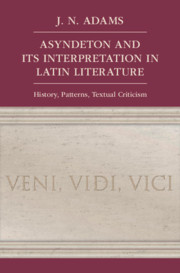Book contents
- Asyndeton and its Interpretation in Latin Literature
- Frontispiece
- Asyndeton and its Interpretation in Latin Literature
- Copyright page
- Contents
- Preface
- Acknowledgements
- Abbreviations
- Part 1 Introduction
- Chapter I Asyndetic and Syndetic Coordination: Definitions and Types
- Chapter II ‘Asyndeta’ That May Not Be Asyndeta: Roles of Adjectives; Appositional Compounds; and ‘Asyndetic Hendiadys’
- Chapter III Asyndeton Versus Coordination, an Introduction
- Chapter IV Lists of Two Types
- Chapter V Supposed ‘Effects’ of Asyndeton
- Part 2 ‘Grammatical’ Types
- Part 3 Semantic Types
- Part 4 Structures
- Part 5 Genres And Texts
- Part 6 Conclusions
- Bibliography
- Subject Index
- Index Mainly of Selected Pairs and Longer Sequences
- Selective Index Locorum
Chapter II - ‘Asyndeta’ That May Not Be Asyndeta: Roles of Adjectives; Appositional Compounds; and ‘Asyndetic Hendiadys’
from Part 1 - Introduction
Published online by Cambridge University Press: 13 May 2021
- Asyndeton and its Interpretation in Latin Literature
- Frontispiece
- Asyndeton and its Interpretation in Latin Literature
- Copyright page
- Contents
- Preface
- Acknowledgements
- Abbreviations
- Part 1 Introduction
- Chapter I Asyndetic and Syndetic Coordination: Definitions and Types
- Chapter II ‘Asyndeta’ That May Not Be Asyndeta: Roles of Adjectives; Appositional Compounds; and ‘Asyndetic Hendiadys’
- Chapter III Asyndeton Versus Coordination, an Introduction
- Chapter IV Lists of Two Types
- Chapter V Supposed ‘Effects’ of Asyndeton
- Part 2 ‘Grammatical’ Types
- Part 3 Semantic Types
- Part 4 Structures
- Part 5 Genres And Texts
- Part 6 Conclusions
- Bibliography
- Subject Index
- Index Mainly of Selected Pairs and Longer Sequences
- Selective Index Locorum
Summary
If two terms are juxtaposed without a coordinator they need not be in asyndeton, though it is commonly assumed in commentaries that any juxtaposed words of the same part of speech must be asyndetic. There are various relationships between two words that may rule out the insertion of a coordinator. For example, if the two are adjectives, they may differ hierarchically (see e.g. Quirk et al. 1972: 550–1), a distinction sometimes referred to as ‘rank’. Or one may be attributive and the other predicative, or a secondary predicate (see below). A pair may form an ‘appositional compound’. Again, one term may be a modifier of the other, with overt coordination possibly unnecessary or inappropriate, though this type is rather nebulous. All these categories will be illustrated below. Perhaps most important are the roles of adjectives, such as attributive versus predicative. The distinction is sometimes neglected in literary commentaries.
- Type
- Chapter
- Information
- Asyndeton and its Interpretation in Latin LiteratureHistory, Patterns, Textual Criticism, pp. 33 - 54Publisher: Cambridge University PressPrint publication year: 2021



